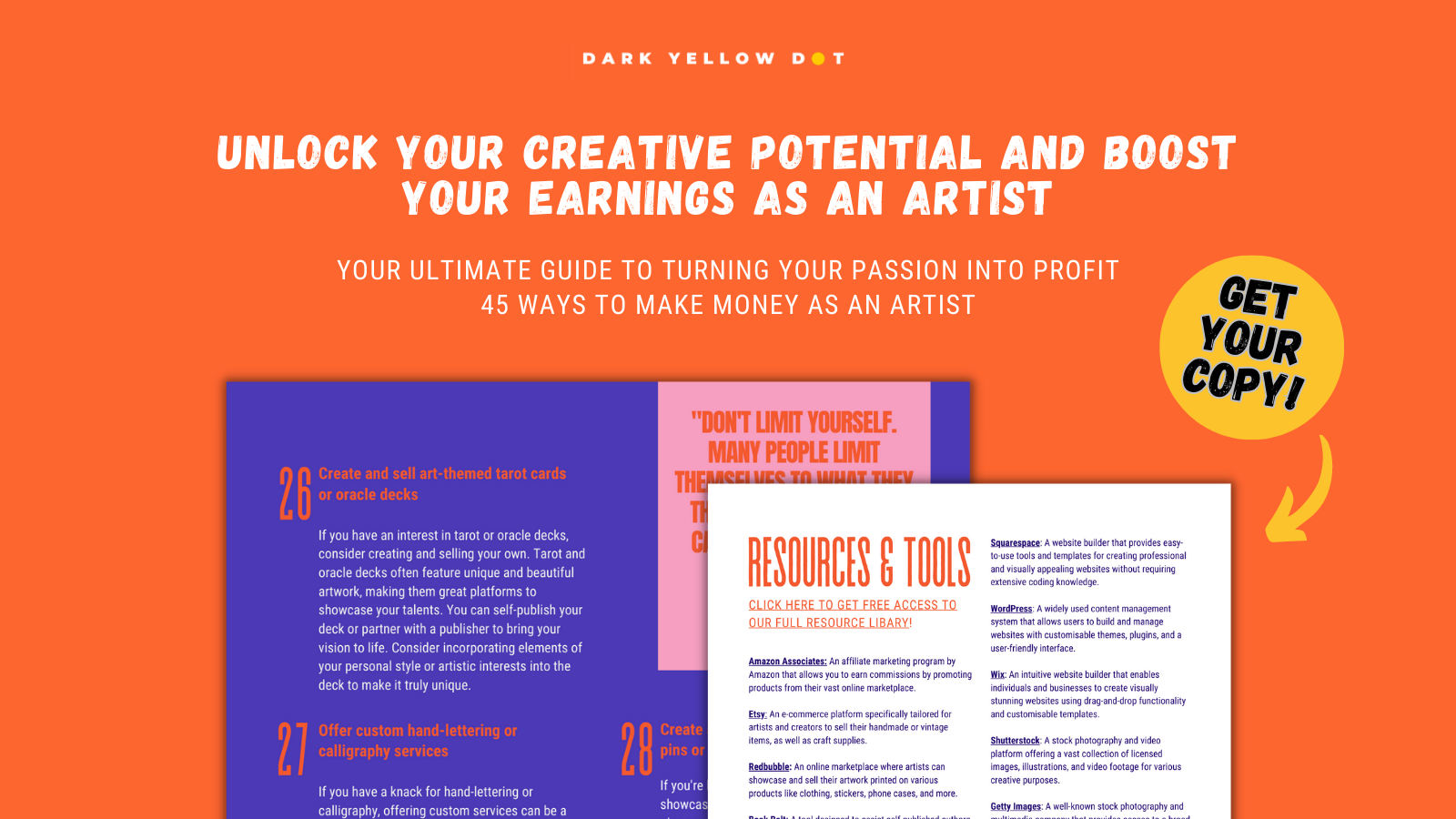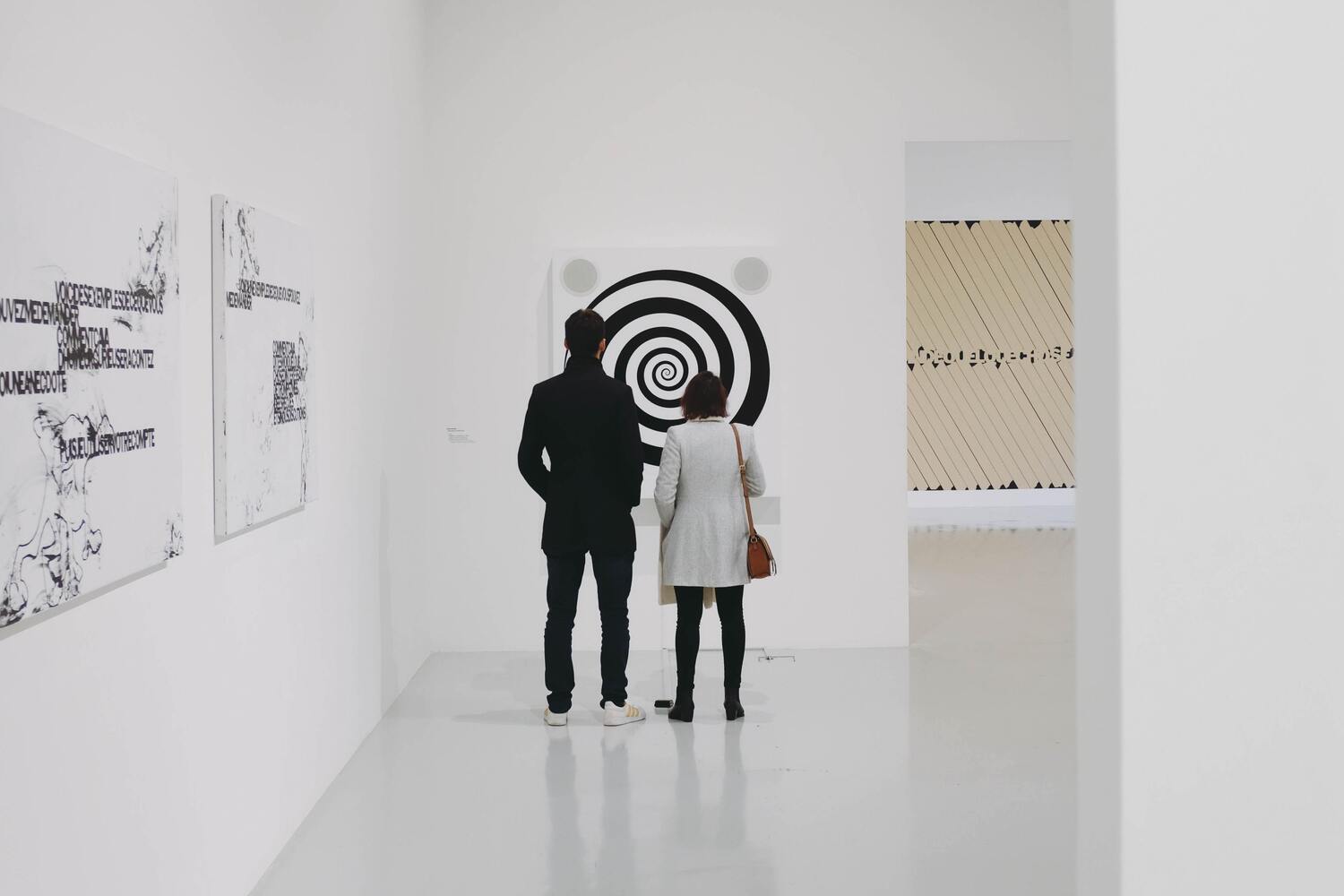
10 Smart Tips To Help You Successfully Secure Arts Funding
Heads up: This post may contain affiliate links. Learn more.
How Any Artist Can Acquire Funding From Arts Council England
Securing funding is an important step for many artists, as it can greatly affect their future projects and time scale. But applying can be tricky, especially if it’s your first time! So what’s the best way to find out than hearing the real, successful story of someone who’s gone through the process.
For our 4th art talk centred around funding, we had the pleasure of sitting down with the founder of Dark Yellow Dot, Lauren Little. In this talk, Lauren shares advice, tips, and resources that were integral in helping her to successfully secure funding for numerous projects, big and small.
What is arts funding and Arts Council England?
This talk, which forms part of our video library and was partly funded by Arts Council England. Arts Council England is a government-funded body geared towards promoting the creative arts in England and became what we know it as today in 1994. The funds and grants this body offers are a massive resource in the life of any artist, offering to fund between £100 – 100K for projects. However, being accepted is not an easy feat, with most new applicants being rejected.
Lauren thoroughly discusses the key information and different stages you encounter when trying to secure funding through applications like those at Arts Council England. She includes ideas on where to look for funding as a beginner, how you should prepare, and the common do’s and don’ts that go into any arts funding process.
10 Useful Tips when Applying for Funding from Arts Council England
1. Make yourself sound spectacular
Selling yourself as an artist is not an easy task, and it can be even harder when having to write about why you are the best candidate. This can be tricky, If you can’t convince yourself then you might struggle to convince large organisations. A good way of learning to sell yourself is to make yourself sound so great that everyone wants to work with you. Try talking about yourself in a positive light, practise by talking or writing about yourself like you are talking about the person you admire the most in your life; whether that be someone you know or someone you idolise, don’t sell yourself short.
2. Communicate with successful applicants
Slightly tricky if you don’t know any artists who have been awarded grants or you’re not the best at networking. But there are areas online where you can find successful applications like White Pube‘s Funding Library or communities of artists such as Dark Yellow Dots art club. Ask how they found the process of applying and if they recommend adding something in particular. The White Pube has a few different areas on their website where you can find good examples and further your understanding of funding without having to interact with anyone, but we still suggest reaching out where and if you can.
3. Write in a separate word document & save!
It’s safe to say that we’ve all been there, either in a game or document that you’ve been so focused on that you haven’t recently saved. Online applications often will not save your progress or the things you have written, so a good precaution is to copy the questions into a different document like Google Docs (which autosaves) and write them there. That way, if your browser crashes or you accidentally click off, you have it stored somewhere safe. It’s also super useful to come back and look at your application with fresh eyes the next day.
4. Review your text with a text-to-speech app
After writing any document, ones eyes and mind may start to wonder. You will often misread and glaze over spelling mistakes or grammatical errors even when checking for the 10th time. Try using a text-to-speech app or your built-in computer setting to hear back your writing instead; a great way of eliminating errors in any given written document It can be a very helpful tool as you have control over the speed that the application is reading amongst other settings and features. Don’t have the app or setting function? There are also websites you can use to do this, or simply ask someone to read it out loud for you.
5. Have someone look over your application
Whilst text to speech can help you identify issues yourself, it doesn’t catch everything. Whether it be a different word or helping to rephrase a sentence, having someone else look over your application is key. Anyone can be helpful, an old tutor, partner, friend, or sibling; talking it through may bring new elements to light that you hadn’t noticed, and give you a different perspective. We say this piece of advice is essential with almost every kind of application or important written document!
6. Respond to the questions asked
It may seem obvious but let’s elaborate on what Lauren recommends. Our intention is to always answer the question, however, it can be very easy to drift into other domains and forget what your point is. A good sum of artists might discuss the project and generalise what they’re doing instead of answering the specific question that is being asked; for example, someone asks you what your favourite meal is and then you going on a tangent about Italian food without specifying a meal. A good way to stop this is by studying your project and finding the direct answers there.
7. Don’t over promise data
Lauren specified that the data you produce for your project is a very important factor in getting a grant. Whilst making your numbers seem a little bit larger may appear as harmless bonus points; it’s not a good idea to lie about match funding or feedback. Match Funding is when funding is paid in proportion to funding other sources. The institution could see your match funding “estimates” as a good enough reason for you not to get the grant. So be honest about your current data and the estimates you are expecting. At the end of the day, your figures need to add up and if not, you’ll be found out eventually.
8. Attend information sessions
Something Lauren made clear in her talk is that Arts Council England are very transparent about what they’re looking for and want from you. As a trusted and large resource in the arts community, they want you to be as informed as possible. As a result, you can find a majority of their information on their site, but they also have information sessions online that answer any specific questions that might be stifling you. If you’re serious about earning arts funding this is a very useful tool, as it can help you to absorb as much information as possible.
9. Hold on to that PDF
Once you have submitted the application you are given the option to save it and download as a PDF. Having your original version of the application is a great referencing tool to have down the line. Even if the application is rejected, you’ll be able to assess the things you did well and what you should change for future attempts.
10. Try and Try again
If your application does not get accepted, it’s okay. Grants are very competitive. Many artists find themselves applying time and time again, so do not be discouraged by any rejection. Grants are always open and allow for multiple applications. So try again in a year or a few months, taking this time to adjust your application, practice your art proposals, and work on whatever other projects you have going on. Lauren urges you to not feel discouraged, as overcoming rejection is all part of an artist’s journey throughout their career.
The Takeaway
Funding is something that all artists should understand and have access to. The world of fine art is often seen as a place for individuals from higher classes, but this is untrue. Institutions and organisations such as Arts Council England are here to increase arts accessibility and build projects they believe in. So hopefully, in conjunction with this art talk, these 10 tips have helped you to further your funding knowledge and give your application a boost.
To watch Lauren Little’s talk about arts funding and experience our conversations with artists like Kelly Frank and illustrators like Lizzie Knott, join Dark Yellow Dot’s Art Club. By becoming a member, you’ll gain access to a wealth of resources and opportunities from workshops to art nights, where artists are supported by a network of creative friends and like-minded individuals. If you take anything from Lauren’s talk, let it be that the creative journey is a difficult one to face on your own, so join us and be part of a creative community today.
Have you got any tips for securing arts funding? Let us know in the comments below!
Don’t forget you can always share your art with us! Submit your work or tag us on Instagram @darkyellowdot.
Thank you for reading and if you found this article useful, share it around, that makes us happy. To receive updates and more posts like this just join our mailing list, everyone is welcome.
Need more advice?
The White Pube Funding Library
How To Write Successful Art Proposals In 2022
How to Overcome Being Shy With these Top Networking Tips For Artists
8 Ways to Kickstart Your Career After Leaving University






